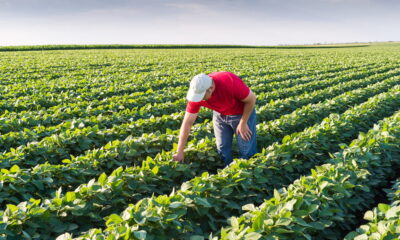

Environment
Salt degradation risking food security, says UN study
A study from the UN has found that an area of previously fertile land equivalent to the size of France has been damaged by salt, putting food security at risk.
Blue & Green Tomorrow is currently running a crowdfunder to ensure its survival. Please pledge.
The study, from the UN University’s Canadian-based Institute for Water, Environment and Health (UNU-INWEH), found that every day for more than 20 years, an average of 2,000 hectares of irrigated land across 75 counties have been degraded by salt. In total around 62 million hectares, or 20%, of the world’s irrigated lands have been affected.
Sale degradation occurs in arid or semi-arid regions where rainfall is low and there is no natural or artificial drainage system.
The findings are of particular concern when the world’s growing population is considered. A previous UN backed report warned that population increases and changing diets means the world needs to produce 70% more food, as measured in calories, in order to meet demand in 2050.
Manzoor Qadir, assistant director of water and human development at UNU-INWEH, said, “To feed the world’s anticipated nine billion by 2050, and with little new productive land available, it’s a case of all lands needed on deck. We can not afford not to restore the productivity of salt-affected lands.”
Zafar Adeel, director of UNU -NWEH, noted that whilst investments had been made in developing countries for irrigation and drainage the infrastructure has not been properly managed or maintained.
“Efforts to restore those lands to full productivity are essential as world population and food needs grow, especially in the developing world,” he added.
In order to reverse the affected land, the study suggests a range of methods, including tree planting, deep ploughing and cultivating salt-tolerant varieties of crops. Whilst the researchers note that action could be costly, it adds that inaction could be more expensive in the long run.
Photo: Ayla87 via Freeimages
Further reading:
FAO: agricultural emissions have doubled in 50 years
Farming organisations claim pesticide ban threatens UK agriculture
Lunch in the sunshine – the relationship between agriculture and climate change
UK’s food security at risk from climate change and unsustainable diets
Reliance on fewer crops will increase climate change food security threat


 Environment12 months ago
Environment12 months agoAre Polymer Banknotes: an Eco-Friendly Trend or a Groundswell?

 Features11 months ago
Features11 months agoEco-Friendly Cryptocurrencies: Sustainable Investment Choices

 Features12 months ago
Features12 months agoEco-Friendly Crypto Traders Must Find the Right Exchange

 Energy11 months ago
Energy11 months agoThe Growing Role of Solar Panels in Ireland’s Energy Future





























